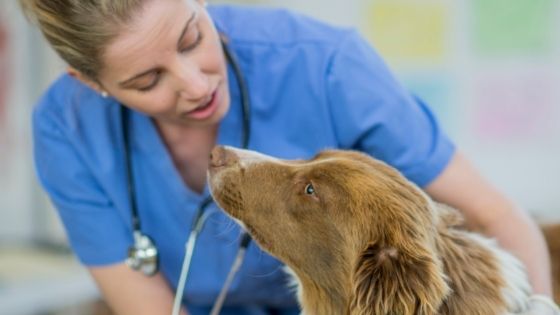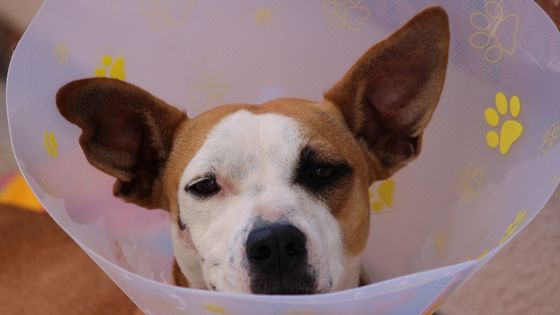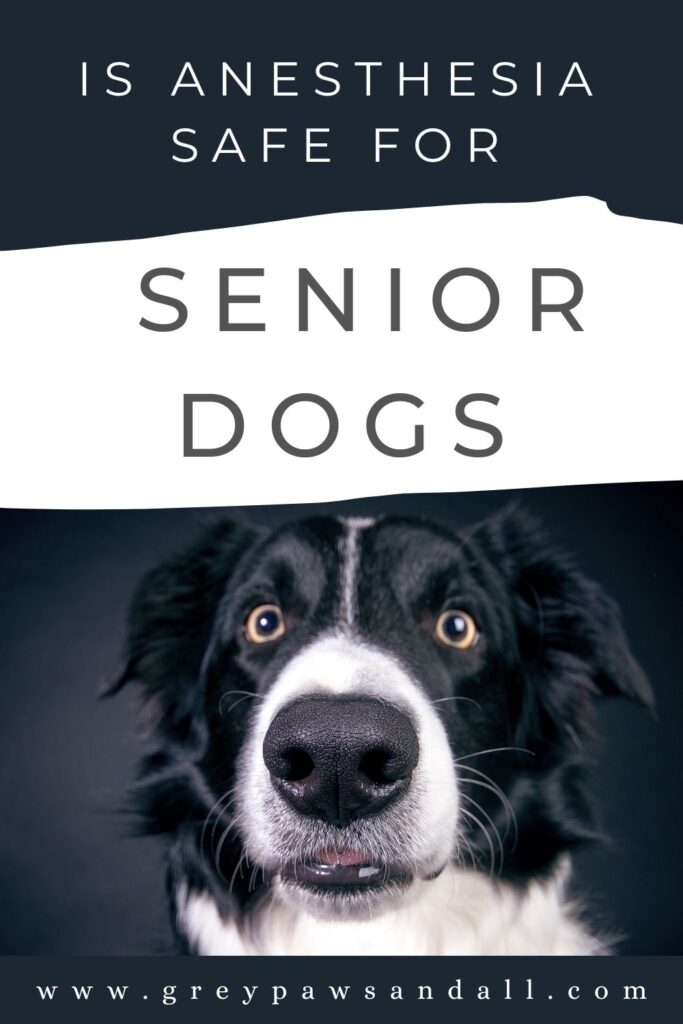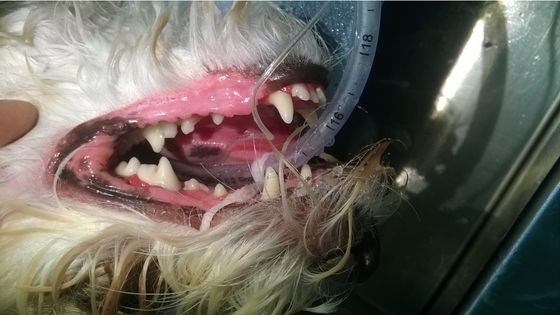There is a widespread fear among senior dog parents that giving anesthesia to a senior dog is too dangerous, and not worth the risk.
Anesthesia is riskier for animals than humans, and when dealing with a senior dog the risk is greater. Having said that, I don’t recommend you refuse any procedure that requires anesthesia outright. The best thing to do is have a face to face meeting with your vet. Have him explain what the operation is for, how it will help, pros and cons of doing it versus not doing it, and how to reduce the risk of something happening during the surgery. Only then can you make an informed decision.
I have confronted this fear on several occasions, each time one of my old dogs needed surgery. Like you, I would never want to do anything that might harm my animal, but at the same time I know how much they could benefit when dental disease is an issue, for example. On one occasion, my vet was recommending dental surgery for my 15ish year old heart dog Red. She was blind, and even though she had been blind for a long time, even before I adopted her, coming out of anaesthesia was rough for her. Her heart murmur and kidney issues were an added concern. I had a face to face chat with my vet, we talked about the benefits and risks of doing it versus what could happen if we just relied on long term antibiotics.
There are two things that made me comfortable saying yes. One was how much I trust my vet. I was confident if something were to happen to her during the operation, it would not be his fault. The second was, if we waited she would be that much older and the problem would be that much worse. It was the right decision, especially after finding out her dental disease was more extensive then originally thought.
What is Anesthesia?
I just learned anesthesia comes from the Greek word meaning “lack of sensation.”
According to the American Veterinary Medical Association, “Simply put, anesthesia is a controlled unconsciousness, where your pet’s level of consciousness is controlled so they don’t feel pain and don’t move. We certainly don’t want our pets to feel pain whenever possible, and it’s important that they don’t move because precision is required during these procedures and movement could lead to complications.”
Should You Be Worried About Your Dog Undergoing Anesthesia?
Of course you should be concerned, but making yourself miserable from worry won’t help anyone. Anesthesia is safer than ever, and while the risk of death during surgery is a real possibility, according to the AVMA, it is rare. Complications can occur, but a well trained vet and team can deal with them as they arise.
There are times when anesthesia is considered “high risk” and that’s when dealing with a pet with health issues. That’s why it’s so important to weigh the pros and cons with your vet. In some cases, your vet may recommend having the surgery done at a specialist hospital, where an anesthesiologist and other specialists can handle anything that may come up.

What to Discuss With Your Vet Pre Surgery
As I’ve mentioned, the best thing to do is talk to your vet so you can both make the best decision for your senior dog.
Find out…
- Is surgery the only option. If not, what other options do you have
- Is your dog in pain
- Can the pain be managed through other means
- What difference(s) can you expect to see after surgery
- Is it a cure
- Will it improve his quality of life
- What will the vet do to reduce as much risk as possible i.e. is there a gentler type of anesthesia for example
- How will your dog be feeling after surgery
- Will they send him/her home with pain relief
- What can you do to make your dog more comfortable
- How can you tell if something is wrong, and should you go to the emergency hospital if it’s out of hours
What are the Risks of Anesthesia in Dogs?
According to the VCA Animal Hospitals website, “It is generally estimated that approximately 1 in 100,000 animals will have some sort of reaction to an anesthetic agent. These reactions may range from mild swelling at the site of injection or a mild decrease in cardiac output, to a full-blown episode of anaphylactic shock or death. However, many experts estimate the risk of anesthetic death is lower than the risk of driving to and from the hospital to have the anesthetic procedure.”
Are Some Dog Breeds More Prone to Side Effects Than Others?
I was curious to find out if some breeds are more prone to issues while under anesthesia. I imagined it’s not an easy question to answer, especially with all the mixtures out there! I did find an article that talks about purebreeds and their risks, which you may be interested to read ⇒ “Does Your Purebred Dog Have Specific Anesthetic Risks?“
At the end of the day, no matter what your dog’s parentage, we need to do all we can to ensure they get through their operation as safely as possible.
How to Minimize the Risks of Your Dog Going Under Anesthesia
What your vet can do
Before your dog has surgery, your vet will want to do tests to check for any medical problems that could indicate an anesthesia risk. They’re typically just blood tests, but depending on your dog may also include urine tests, x rays and ECG.
What you can do
- Make sure your vet is aware of all medications and supplements your dog takes
- Let him or her know of any reactions your dog may have experienced in the past
- Follow your vet’s instructions on what to do before surgery, especially when it comes to withholding food and water
- Keep your pet at a healthy weight

How to Help Your Dog Recover After Surgery
♦ The number one way to help your dog recover is to follow your vet’s post op instructions.
♦ Don’t be surprised if your dog doesn’t have much of an appetite, as anesthesia can make your dog feel nauseous. Try to feed him something easy on the stomach like chicken and rice for example. Start with small amounts, a few times a day. Vets often (at least mine does!) send you home with a tin or two of easy to digest food for the first few days after surgery. If your dog still won’t eat after 48 hours, please call your vet.
♦ If your vet doesn’t give you any pain medication or antibiotics to take home, double check and ask why not.
♦ Set your dog up in a nice comfy spot, and keep activity down to a minimum around him.
♦ To prevent him chewing on stitches, buy a cone, t shirt or full body suit.
♦ Even if your dog seems back to normal, don’t skip follow up appointments!
I wrote an article with information you’ll find helpful – “How to Help Your Senior Dog Recover After Surgery“
To Sum Up
I’m trying to say that, of course anesthesia is risky in the best of times, and riskier in old dogs. I’m also saying that each case needs to be evaluated on an individual basis. I assume you have a vet you have complete faith in, and if you don’t I hope you find one. I have an in-depth conversation (I’m a big asker of questions) about why the surgery is needed, are there alternatives, what are the benefits, types of anaesthesia and how can I help the recovery process.
I’ve had two dogs die at the hands of vets I had to go to in a pinch. I have no doubt the outcome would have been very different had I been able to see my trusted vet.
I’ve included some articles I found very interesting, in the resources section below. I recommend reading at least a couple of them, as I’ve found them all very informative.

Has your senior dog undergone surgery, or been put under anaesthesia for some other reason? How did things go? Were you happy with your decision or would you have done things differently in hindsight? Sharing helps others so leave your comments below.
Resources
Study Reveals the True Risks of Anaesthesia in Dogs
When Your Pet Needs Anesthesia
How to Care For Your Pet After Surgery
Is My Dog Too Old for Anesthesia?
I help senior dog parents struggling with anticipatory grief and quality of life issues by offering practical tips, advice and one on one support. I am also a Pet Loss Bereavement Specialist, helping you navigate through your pet loss journey.
Visit my services page to book a FREE 20 minute discovery call, or email me (Hindy) at hindy.greypawsandall@gmail.com if you have any questions.
I’ve been rescuing and caring for senior dogs since 2009. From vision and hearing loss to obesity, dementia, kidney disease, liver issues, cardiac problems, Cushing’s, mobility challenges and more, you could say I’ve dealt with and learned a lot! In addition to my hands on experience, I’ve taken many courses and earned several qualifications to keep learning how to help senior dogs and they include: Senior Dog Enrichment, Understanding Canine Anxiety, Care of the Senior Pet and I’m a Certified Pet Loss Specialist.


Great list of considerations when making the choice to allow a procedure that involves anesthesia for your senior pet. I agree the number one is whether or not you trust your vet. I know my vet is conservative enough to try other methods first and wouldn’t recommend something invasive without being sure Treeno could handle it. And they do testing beforehand.
A lot of members of my FB group say their vets don’t recommend dental surgery for example, because of their dog’s age. I notice many are younger than my dog how had surgery, with fewer health conditions. Being cautious is great, but I always encourage people to chat with their vet and ask why they don’t recommend it and even to seek out a second opinion. Sometimes the best course is to avoid it, but not always.
Fantastic list and it was something that scared me with Layla when she started having cataracts but her vet he would not do surgery because of her age, he did not want to take a chance and I was relieved to hear Your list is such a must read and know for parents with senior pets
It is critical to have a vet you can completely trust. I had a cat who the vet (not my current vet) said she needed to have her teeth clean. She was a senior cat. But the vet was insistent it was best for her and her sister who had her teeth clean at the same time. I went to pick up my girls and the vet came out, led me back to an examination room, and explained that for one of them, they gave too much anesthesia, and tried to recover, but it put her into kidney failure. She lived less than a day. However, she wasn’t in pain. I’m grateful for that at least. I still blame myself for her early demise. Even her sister didn’t make it a full year after that experience. She developed kidney disease soon after. I gave her IV treatments for maybe 3 months. But I lost her about 6-7 months later after her sister. So, when Henry needed to have emergency eye surgery due to a dog attack, I was a train wreck. He did okay. Well, he probably handled it and recovered better than me. But now I’m overly cautious about giving permission for anesthesia (surgery). Thankfully (and knock on wood) Henry hasn’t needed any additional surgery. He has a heart murmur as well. Another surgery for one of my fur kids could give me a stroke. But I do have a much better vet now that I trust a lot more. For me, it’s still a huge leap with surgery if it’s not critical. I’m grateful my current vet will give me options and let me know if something is necessary or not.
Hindy, this was a great article and you provided folks with exactly what they need. I’m sharing with all my dog parents!
This is such helpful information for any senior dog owner who is worried about impending surgery, and your list of suggestions for preparation and recovery is outstanding.
Knowing what YOU can do makes you feel much less helpless and more pro-active. You feel more in control when you know what to do. You can ACT to help without worrying. Your dog is such a huge part of your life that knowing what to do, and ask, gives such peace of mind.
We went through this with my 16 year old pup twice. Both times went fine but I did request a different protocol for the 2nd surgery since the first time it took him longer than I was comfortable with to be back to 100%.
That’s very interesting Tiffany, and thanks for sharing that tip. I wonder how many people would think of asking the vet if there is something to be done, such as discussing a change in type of anesthesia. Our vets are the professionals so we need to trust them, but it’s always important to advocate for our animals so good for you for doing that.
This really is a sensitive topic. I had a horrific, tragic experience following my dog’s “dental cleaning”. I can’t even talk about it….
Oh Cathy I’m so sorry to hear that but I feel your pain, I had a tragic experience as well.
Hindy, another excellent post! I, too, shared the same concern when I needed my dog’s to have surgeries, especially my Gibson who had epilepsy. I took good care of my Huskies’ teeth myself, and did not do dental cleanings except for just two times when two of my dogs needed a professional cleaning, but we only did it when they were under for another surgical reason. Like you, I totally trusted my vet team and vet techs. They cared for my dogs as if they were their own, and always gave me the honest truth and respected my questions and decisions. They were (and still are) amazing, caring, and respectable vets. That is so key, as well as doing our own research so we can have a well-informed conversation. Each time one of my Huskies need to go under anesthesia, they did just fine, I am happy to report! But each time, I had the same conversation with my vets, and we discussed any possible issues, or if any health issues they had and what my options were.
You have wonderful information here that will help others know exactly what questions to ask beforehand. And, as always, above all else, folks need to have a vet they can talk to and trust. If not, find another!
I can imagine the extra concern you had with Gibson undergoing surgery. You never know how epilepsy can affect a dog under anesthesia so the worry is real. You’re lucky to have such an amazing team you can turn to for advice. It’s great you were able to take care of the dogs’ teeth on your own, making dental surgery less likely. I’ve never been able to get to my dogs’ mouths to do that. One thing I did for Jack was have the groomer do a cleaning on a regular basis. I know that’s controversial and got lots of flack when mentioning it in my group, but my vet said she did a great job and if it kept him off the operating table it was worth it.